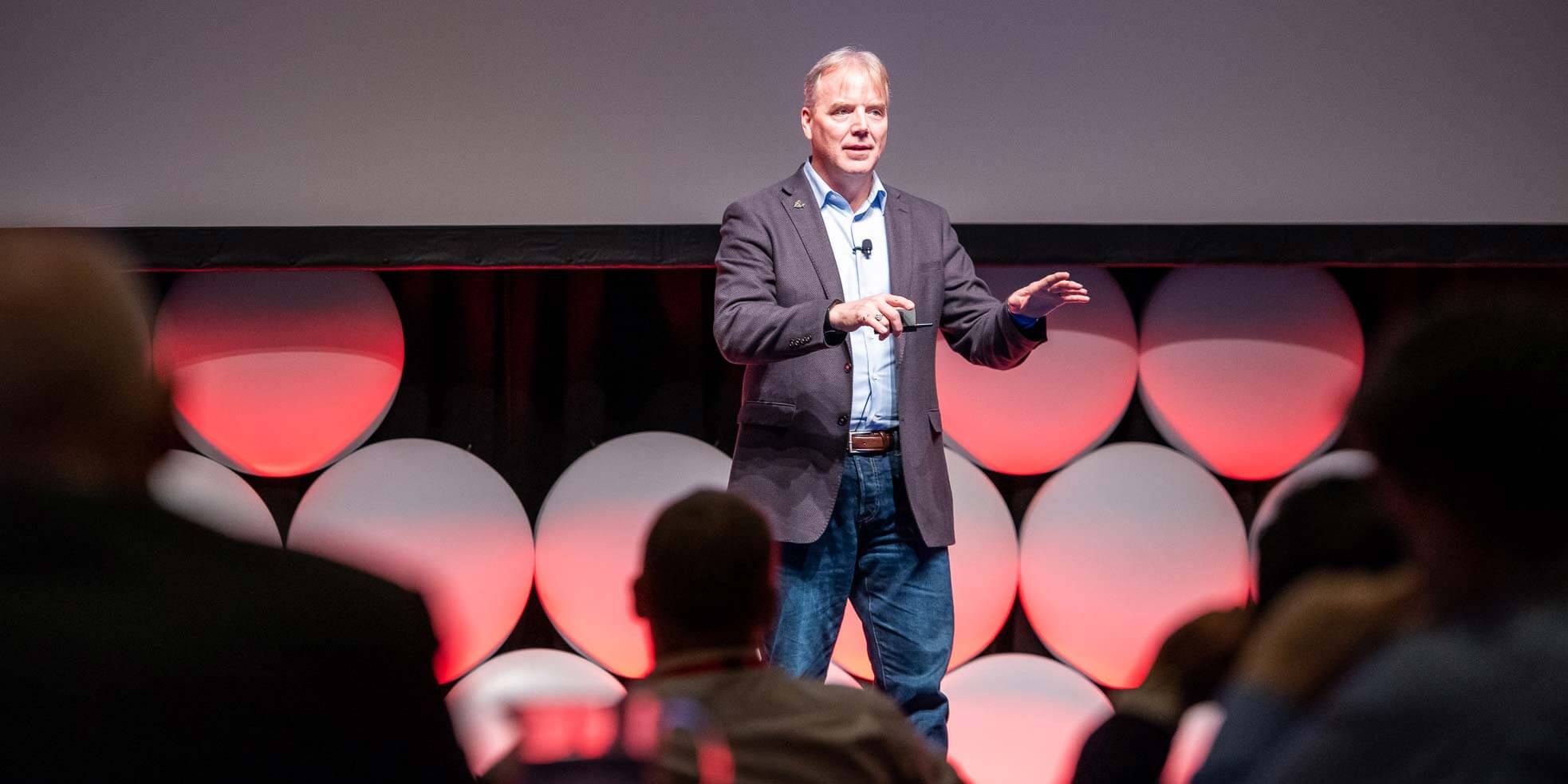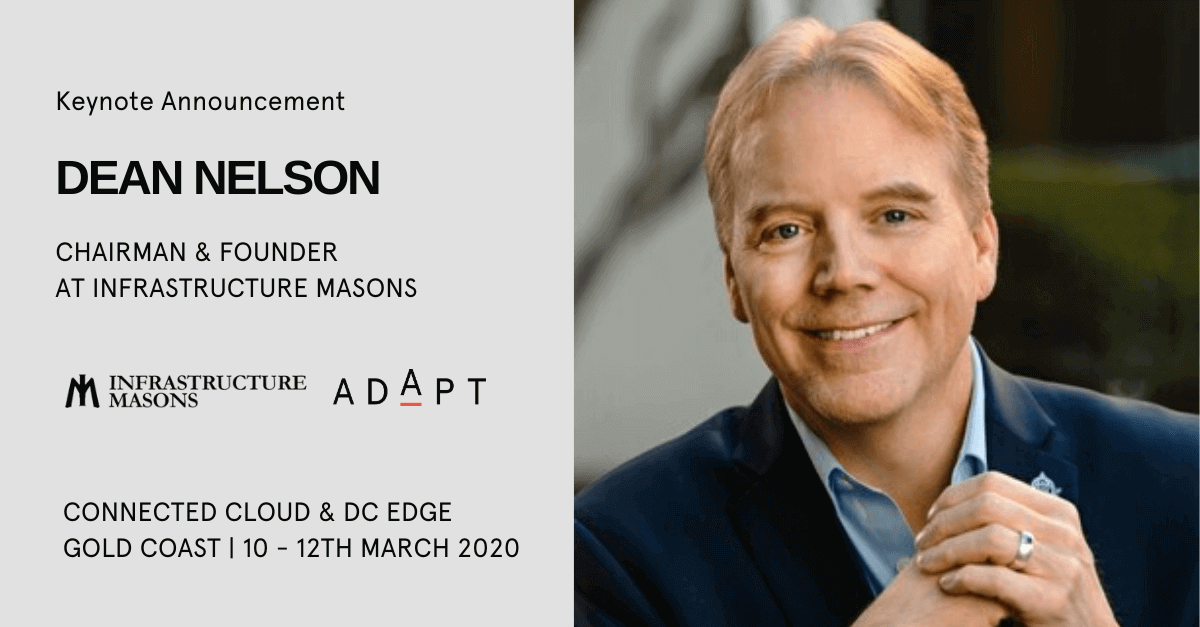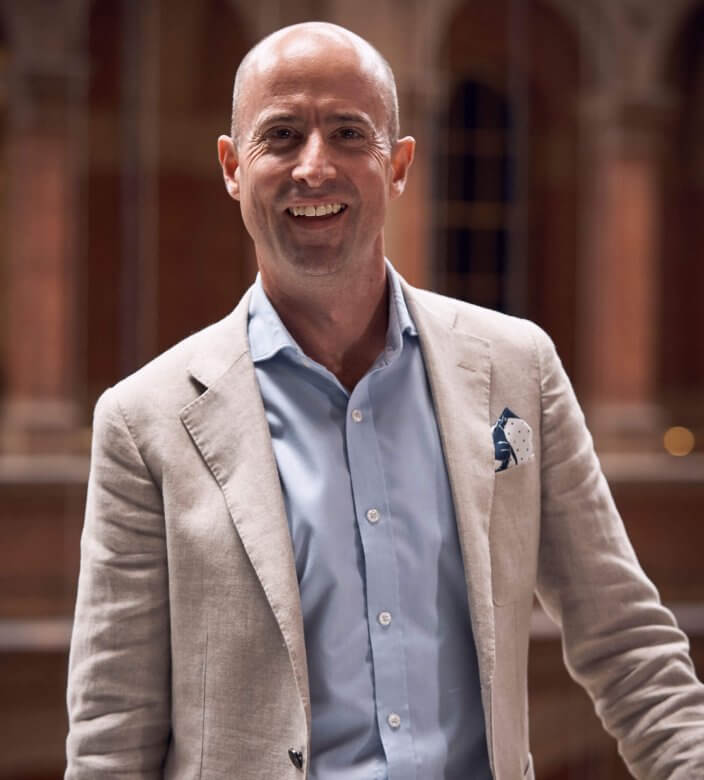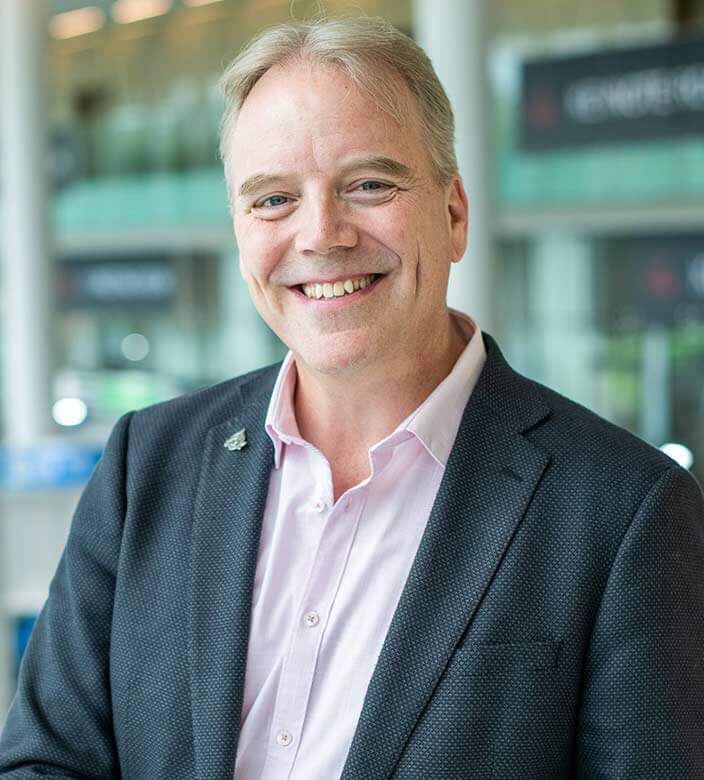Dean Nelson on protecting your future job, Digital Labour and the Infrastructure Masons
Dean will be flying in to attend and keynote ADAPT’s 8th annual Connected Cloud & DC Edge on March 10-12. This weekend he shared with ADAPT’s CEO Jim Berry how AI and digital labour is about to transform future jobs.
In the pursuit of supporting the world’s digital engineers, Dean Nelson founded the Infrastructure Masons. Prior to this role, he was Head of Uber Computer and VP of Global Foundation Services at eBay Inc.
Dean will be flying in to attend and keynote ADAPT’s 8th annual Connected Cloud & DC Edge on March 10-12. This weekend he shared with ADAPT’s CEO Jim Berry how AI and digital labour is about to transform future jobs.
Jim Berry:
Slightly different topic: jobs. The challenges for future jobs. Computing and AI are going to become more accessible. I saw your comment recently about workforce changes with digital labour. If you could talk about that briefly?
Dean Nelson:
So, on February 5th, IPsoft is going to announce its digital labour offering, they call it the digital workforce.
What that means is you’re going to be able to login to the platform, you’re going to be able to test run digital labour. So, I can say I’m looking for a banker that does this one and you can test it out. Or a broker or an IT specialist that is doing Oracle or SAP or anything like this and you can test them.
Then you can download that employee and you can start to leverage that labour in your enterprise.”
That sounds insane. But it’s real. And so, everybody should watch that podcast or that, that actual launch. So, the CEO and IPsoft is just an amazing company, they have true cognitive AI and hundreds of digital employees that have been proven as experts already in their customer deployments. They’re going to now be accessible to enterprise IT, they’re going to aggregate all these.
Jim Berry:
These can just duplicate at scale? Each employee?
Dean Nelson:
Remember this is not a chatbot, right? This is a context of cognitive AI. So, the concept here is, imagine if I’ve got a chat interface with a cognitive AI behind it that is a Workday expert, Oracle expert, EWS cloud, Google cloud expert. I can just say, “Hey, what is the size of my AWS instances?” It knows if they change this from the 32 gigs. Oh, you mean this one? And it’s having a conversation with you like natural language processing because it’s actually cognitive. Now you aggregate all of these enterprise systems together into one interface.
Jim Berry:
Wow.
Dean Nelson:
That’s what I mean! Digitally this going to go replace a lot. And so, I think the punchline is that over the next 10 years, repetitive jobs are just going to get replaced, right? And I think that companies are going to have to come up with a way to cut their costs and lower their costs.
So, people that are impacted by this are going to need to rethink about where are they going to shift their career? What should they be doing? And there are many options for it. But people need to be aware that a lot of these jobs are going to be disrupted. It’s not if, it’s just when.
So, I looked at it from a digital infrastructure standpoint. We have the other problem; we don’t have enough labour. Think about all of the departments we just talked about. Who’s going to do that work?
We need a lot of people and in the automation side or putting scholarships out to attract people into the industry so that we can build a pipeline up for more talent because I think there’s just a shortage coming.”
Every one of our member companies doesn’t matter if it’s Google or Facebook or any of the data centre companies, etc, they have the same problem, getting talent.
So, there’s kind of two sides to this coin, right? Everything that’s going in digital infrastructure and we need people to help it. And then the other side a lot of the other jobs are going to be replaced, right? With digital labour. But there’s a number of them that aren’t. They’re going to need, and we’re going to need more people on that side.
Jim Berry:
So, you referenced Infrastructure Masons and you’re Founder and Chairman of Infrastructure Masons, a global not-for-profit, and your mission includes a focus on future jobs and diversity. In fact, we’re opening the event with you guys – we’re doing a proper two-hour workshop on “Future Jobs”.
One of the things we’ve seen, people feared cloud might marginalise their job. Now it’s AI and automation and people talk about re-skilling from traditional roles that are being disrupted. But do you think that’s honestly feasible? A lot of the big corporates, they literally just let people go and then rehire others. In this area, data centre, Co-Lo engineering infrastructure, as we see AI, labour augments as well. There is a skill shortage now, but what do you think people should do from a re-skilling point of view?
Dean Nelson:
I really, if I was in the position of having a potential job is disrupted it’s about being aware of it. So, first off, if you’re in IT support and you’re answering calls, you’re responding to emails, you’re logging into the database systems are doing those things? Those jobs are going to get disrupted. They are. So, what I just mentioned about digital labour.
Because there are already AI digital colleagues that can do those things better than you when it comes to repeatability consistently.”
Policy-based and then there’s cognitive AI on top of that to ensure that you’re covering all of your SLA and everything.
So, you need to think about, well, what is my next career move? What else is needed? So, to orchestrate a lot of that there’s architecture, right? There’s management, there are things where the jobs may be replaced and scale will go up, but it’ll press other things that are needed. You need to look at what job you have today, will it get disrupted? And then you’d look around and say, where will those jobs open up because of that disruption? They don’t all just go away other jobs are created. And so, you now need to think about retooling your skills to do it. And I think to have a straight conversation with your management team about it. What else can I learn? What can I do here? What do you see being replaced in the future? Address it head-on.
Jim Berry:
Well, we’re going to have maybe 150-200 of the heads from all of the national enterprise government education organisations and some of the Co-Los onsite with us and with you for that workshop on Future Jobs. So hopefully we’ll come out with some practical suggestions in March.
Dean Nelson:
What I really like about the Infrastructure Masons workshops is that we get the brain trust in a room. And it’s not just about being talked at, it’s about people collaborating and figuring out what are the challenges? Defining the problems and how we should approach it. And it’s all those life experiences, work experiences coming into a collective that is really the main power, right? We’re a community and the community can solve things together.
We unite the builders of the digital age so that we can go after these things and work together. Education and workforce and all. This is just another topic for us to go through because it’s going to impact everybody.
Jim Berry:
And ”Leave the logos at the door”, I think was one of your phrases.
Dean Nelson:
We leave our companies at the door and we connect, grow and give back. And part of that is you’re just giving and you’re discussing and debating with other professionals and peers. If there’s no pressure, there’s no sales and anything else. This is about us as individuals. And we love it. It has worked really well. It builds relationships and a community that’s very strong globally.
Jim Berry:
Well, as I said with that we’re going to have roundabout 300-400 delegates on site. It’s our eighth year. The Connected Cloud and Data Centre Edge event by ADAPT. We’re going to very much look forward to hosting you over those 48 hours and some of your colleagues. But most importantly we always bring the community together and there are some pretty hard topics to take on this year very much looking forward to hosting you Dean when you come over.
Dean Nelson: Excellent looking forward to it.
At Connected Cloud & DC Edge in March, Infrastructure Masons’ Dean Nelson will fly out to Australia to deliver his keynote “Are you ready for ruggedized and secure Edge?” He will share how Edge will dwarf core data centre capacity in the next 5 years and security threat vectors will grow 1000x.



























